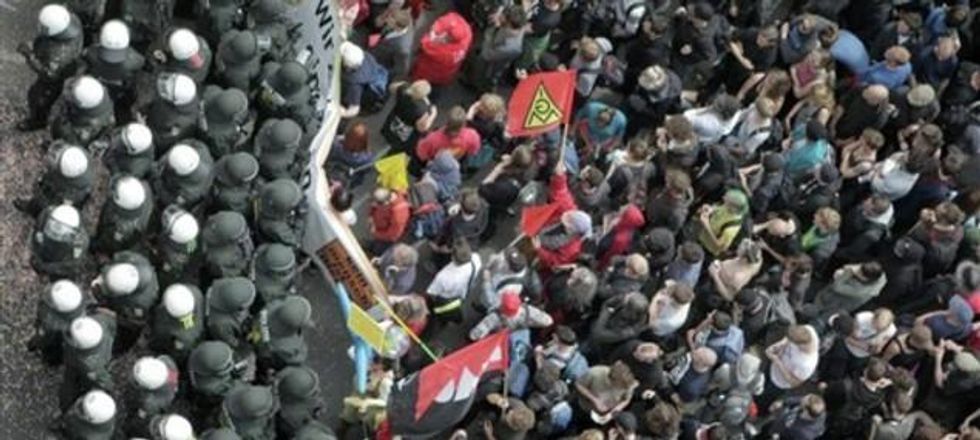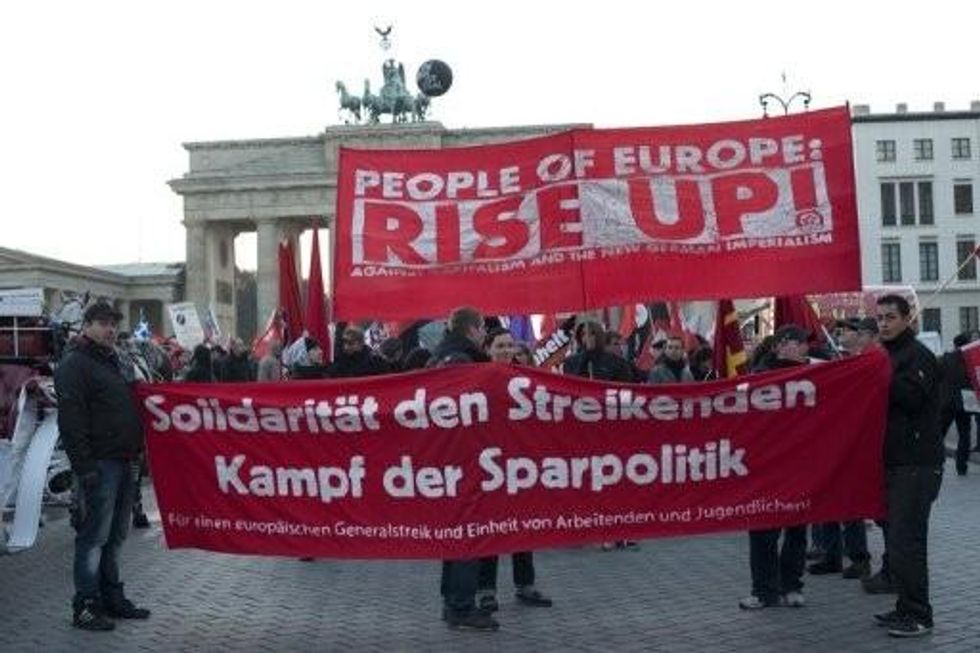

SUBSCRIBE TO OUR FREE NEWSLETTER
Daily news & progressive opinion—funded by the people, not the corporations—delivered straight to your inbox.
5
#000000
#FFFFFF
To donate by check, phone, or other method, see our More Ways to Give page.


Daily news & progressive opinion—funded by the people, not the corporations—delivered straight to your inbox.

Released this week, official statistics showed the EU has broken unemployment records, with the continent's unemployment rate at over 12 prercent and nearly 1 out of every 4 youth jobless. Such statistics, say demonstrators, shows the ineffectiveness of the dominant economy policies over the last several years.
In Frankfurt, Germany a second straight day of protest was targeted at the European Central Bank, one of the three institutions in Europe known collectively as "the Troika" which also includes the European Commission and the International Monetary Fund. Under their authority, the struggling national economies of Europe have been forced to slash public budgets, cut services, reduce pensions and benefit plans, and privatize public entities like hospitals, energy companies, and transportation
On Friday, protesters under the banner of "Blockupy Frankfurt' shut down the ECB from "business as usual" by surrounding the institution's headquarters and blockading the entrances. Following that, the group said many more thousands had joined for Saturday's march, with more than 20,000 reportedly attending.

The Blockupy activists say that even though Germany is portrayed as Europe's strongest economy, the reality is that many Germans object to the mistaken and heavy-handed role its country has played in the ongoing crisis in Europe.
Calling its government a "profiteer of crisis," the group said in a statement, it was the labor market reforms pushed through in Germany in 2004, including "slashing long fought-for workers' rights and securities" that is now serving "as the model for the neoliberal reforms that the German government and European financial elites try to push in all of Europe."
"Real wages have declined in Germany for the past ten years," the statement continued, "while the financialization of ever more spheres of life and the privatization of ever more common goods and spaces lead to a drastic increase in the cost of living. We are struggling against increasing precarity and its constant stress and social destruction."
Tweets about "#Frankfurt OR #Blockupy lang:en"
Agence France-Presse reports from scenes in Greece, Spain and Portugal:
Protesters say the belt-tightening measures applied by many governments to try to meet these conditions unfairly penalise the poor as some governments have been forced to slash jobs and raise taxes.
Sixty-two-year-old Marica Frangakis from Greece said: "It's good to see that people (in Germany) also feel concerned about the crisis."
In Greece, she said, people "are desperate after a five-year crisis".
According to police, around 5,000 people took part in the Frankfurt rally which will end in front of the ECB building.
In Lisbon, demonstrators are symbolically set to march to the International Monetary Fund's (IMF) representational office.
"This time, there won't only be Portugal pounding the pavement, but all the people in Europe will demonstrate against the austerity recipe," Portugal's "Que se lixe la troika" (Screw the Troika) movement said in a statement.
Rallies are also expected in 17 other Portuguese cities.
In Madrid, protestors plan to march past the stock market, central bank and the Madrid delegation of the European Commission, carrying slogans saying "We don't owe, we won't pay" and "Troika Go Home".
________________________________________
Political revenge. Mass deportations. Project 2025. Unfathomable corruption. Attacks on Social Security, Medicare, and Medicaid. Pardons for insurrectionists. An all-out assault on democracy. Republicans in Congress are scrambling to give Trump broad new powers to strip the tax-exempt status of any nonprofit he doesn’t like by declaring it a “terrorist-supporting organization.” Trump has already begun filing lawsuits against news outlets that criticize him. At Common Dreams, we won’t back down, but we must get ready for whatever Trump and his thugs throw at us. Our Year-End campaign is our most important fundraiser of the year. As a people-powered nonprofit news outlet, we cover issues the corporate media never will, but we can only continue with our readers’ support. By donating today, please help us fight the dangers of a second Trump presidency. |

Released this week, official statistics showed the EU has broken unemployment records, with the continent's unemployment rate at over 12 prercent and nearly 1 out of every 4 youth jobless. Such statistics, say demonstrators, shows the ineffectiveness of the dominant economy policies over the last several years.
In Frankfurt, Germany a second straight day of protest was targeted at the European Central Bank, one of the three institutions in Europe known collectively as "the Troika" which also includes the European Commission and the International Monetary Fund. Under their authority, the struggling national economies of Europe have been forced to slash public budgets, cut services, reduce pensions and benefit plans, and privatize public entities like hospitals, energy companies, and transportation
On Friday, protesters under the banner of "Blockupy Frankfurt' shut down the ECB from "business as usual" by surrounding the institution's headquarters and blockading the entrances. Following that, the group said many more thousands had joined for Saturday's march, with more than 20,000 reportedly attending.

The Blockupy activists say that even though Germany is portrayed as Europe's strongest economy, the reality is that many Germans object to the mistaken and heavy-handed role its country has played in the ongoing crisis in Europe.
Calling its government a "profiteer of crisis," the group said in a statement, it was the labor market reforms pushed through in Germany in 2004, including "slashing long fought-for workers' rights and securities" that is now serving "as the model for the neoliberal reforms that the German government and European financial elites try to push in all of Europe."
"Real wages have declined in Germany for the past ten years," the statement continued, "while the financialization of ever more spheres of life and the privatization of ever more common goods and spaces lead to a drastic increase in the cost of living. We are struggling against increasing precarity and its constant stress and social destruction."
Tweets about "#Frankfurt OR #Blockupy lang:en"
Agence France-Presse reports from scenes in Greece, Spain and Portugal:
Protesters say the belt-tightening measures applied by many governments to try to meet these conditions unfairly penalise the poor as some governments have been forced to slash jobs and raise taxes.
Sixty-two-year-old Marica Frangakis from Greece said: "It's good to see that people (in Germany) also feel concerned about the crisis."
In Greece, she said, people "are desperate after a five-year crisis".
According to police, around 5,000 people took part in the Frankfurt rally which will end in front of the ECB building.
In Lisbon, demonstrators are symbolically set to march to the International Monetary Fund's (IMF) representational office.
"This time, there won't only be Portugal pounding the pavement, but all the people in Europe will demonstrate against the austerity recipe," Portugal's "Que se lixe la troika" (Screw the Troika) movement said in a statement.
Rallies are also expected in 17 other Portuguese cities.
In Madrid, protestors plan to march past the stock market, central bank and the Madrid delegation of the European Commission, carrying slogans saying "We don't owe, we won't pay" and "Troika Go Home".
________________________________________

Released this week, official statistics showed the EU has broken unemployment records, with the continent's unemployment rate at over 12 prercent and nearly 1 out of every 4 youth jobless. Such statistics, say demonstrators, shows the ineffectiveness of the dominant economy policies over the last several years.
In Frankfurt, Germany a second straight day of protest was targeted at the European Central Bank, one of the three institutions in Europe known collectively as "the Troika" which also includes the European Commission and the International Monetary Fund. Under their authority, the struggling national economies of Europe have been forced to slash public budgets, cut services, reduce pensions and benefit plans, and privatize public entities like hospitals, energy companies, and transportation
On Friday, protesters under the banner of "Blockupy Frankfurt' shut down the ECB from "business as usual" by surrounding the institution's headquarters and blockading the entrances. Following that, the group said many more thousands had joined for Saturday's march, with more than 20,000 reportedly attending.

The Blockupy activists say that even though Germany is portrayed as Europe's strongest economy, the reality is that many Germans object to the mistaken and heavy-handed role its country has played in the ongoing crisis in Europe.
Calling its government a "profiteer of crisis," the group said in a statement, it was the labor market reforms pushed through in Germany in 2004, including "slashing long fought-for workers' rights and securities" that is now serving "as the model for the neoliberal reforms that the German government and European financial elites try to push in all of Europe."
"Real wages have declined in Germany for the past ten years," the statement continued, "while the financialization of ever more spheres of life and the privatization of ever more common goods and spaces lead to a drastic increase in the cost of living. We are struggling against increasing precarity and its constant stress and social destruction."
Tweets about "#Frankfurt OR #Blockupy lang:en"
Agence France-Presse reports from scenes in Greece, Spain and Portugal:
Protesters say the belt-tightening measures applied by many governments to try to meet these conditions unfairly penalise the poor as some governments have been forced to slash jobs and raise taxes.
Sixty-two-year-old Marica Frangakis from Greece said: "It's good to see that people (in Germany) also feel concerned about the crisis."
In Greece, she said, people "are desperate after a five-year crisis".
According to police, around 5,000 people took part in the Frankfurt rally which will end in front of the ECB building.
In Lisbon, demonstrators are symbolically set to march to the International Monetary Fund's (IMF) representational office.
"This time, there won't only be Portugal pounding the pavement, but all the people in Europe will demonstrate against the austerity recipe," Portugal's "Que se lixe la troika" (Screw the Troika) movement said in a statement.
Rallies are also expected in 17 other Portuguese cities.
In Madrid, protestors plan to march past the stock market, central bank and the Madrid delegation of the European Commission, carrying slogans saying "We don't owe, we won't pay" and "Troika Go Home".
________________________________________